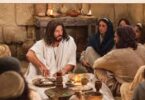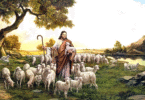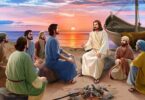28th Sunday of Ordinary Time (Year B)
Scriptures: Wis. 7:7–11; Ps. 90:12–13, 14–15, 16–17; Heb. 4:12–13; Mk. 10:17–30
One of the news that caught everyone’s attention this week was of Rakesh Zunzunwala. He earns Rs. 1125 crores in a single day and is called the big bull or Warren Buffet of India. He is an Indian businessman and stock trader. He is one of the richest persons in our country today. He started investing in stocks during his college days. He started with an investment of Rs. 5000; today, his net worth is Rs. 41000 crores in the Forbes list. His decisions in the early days to invest in certain companies which were insignificant yielded fruits for him. Rakesh Zunzunwala has become the guide for the new and old stockers. The Prime Minister of India shared his experience with him in the recent interviews. Did his wealth make him rich or his wisdom? What attracts people to follow his investments? – Obviously, it is his wisdom in the stock market. This example is of worldly matters. How about divine wisdom?
Today’s liturgy has a beautiful message for us all on this topic. All three readings have a powerful message for us that we need to understand wisdom is the wealth of wise. The first reading from the book of Wisdom was written to the Jews who were diaspora years before Christ. They lived in metropolitan cities like Alexandria, Egypt, etc. They were influenced by Greek (Hellenistic) culture. They took a keen interest in learning Greek philosophy. The elders of the Jewish community felt the danger of getting extinguished in the Hellenistic culture. They feared that they would lose their identity. The elder and learned Jew (author of the book) thought of offering Jewish wisdom to these Jews. It had a very strong message that they should prefer wisdom to every other good thing such as sceptres, thrones, riches, priceless stone, gold, silver, health, beauty and light. The author ends by saying, in her company every good thing came to him. The text has a connotation from the life of King Solomon who preferred wisdom. (1 Kings 3:6-9) God gave him all the riches in his life when he had only asked for wisdom. We need to remember that Jesus recalled the wisdom of Solomon, not his riches.
The second reading from the letter to Hebrews also has a similar message for us. The author writes to the people who were converted to Christianity from Judaism. These Jews were then expelled from their Jewish community. They were forbidden to attend the synagogue services, rituals, and sacrifices in their lives. They felt the pain of separation and ex-communication from their earlier community life. The absence of their rich heritage made them feel that they should return to their old life. The author tries to teach them that the Word of God is powerful. It penetrates the human body and soul like a double-edge sword. They are to give their final account to One who has all authority. The Hebrews had to make the choice between the new life or the old life. They had to make a choice of Jesus who is the Word that came down from heaven. He is the true eternal wisdom. We know that they chose Christ over their old life.
The Gospel passage complements what had been said in the previous two readings. It gives us an account of a man who ran up to Jesus. This man was truly exceptional and wonderful in the whole Gospel. Let us look at the way he is depicted by the evangelist. He gave great respect to Jesus by running up to Jesus and knelt down before him. He called Jesus a good teacher. He was interested in eternal life. He followed the commandments meticulously. Jesus himself was amazed at him and looking upon him loved him (Mk. 10:21) Jesus realized that he had begun to look at him as a good teacher. It means to say that he had come to the knowledge of his divinity. Jesus realized that he had all the qualities to be his disciple. At last, Jesus gave him a challenge to completely dedicate himself to him. Jesus asked him to sell everything he had and follow him. But his face fell at Jesus’ words and he went away sad because he was a man of great wealth. In the whole scriptures, every person who came to Jesus went away with happiness and joy but this man is one of the few people who went away from Jesus sad. Jesus had given him a beautiful choice of following him, the greatest wealth, the eternal wisdom, the source of eternal life but he chose the worldly wealth. He lost the chance because he preferred wealth over wisdom. If he had to choose Jesus over the wealth then we would have known him today as one of the saints-apostles of the Lord.
Today’s liturgy places before us the most important lesson for life: Wisdom is the wealth of the wise. The diaspora Jews followed Jewish wisdom in the first reading. The Hebrews followed the wisdom of apostles and early Christians in the second reading. Whereas, the young man refused to follow Jesus, the eternal wisdom. What should we do to grow in the wisdom of God. We must faithfully pray for wisdom in our daily prayers. We must read the Word of God. We must fear the Lord because fear of God is the beginning of wisdom. We need to be humble and prudent in my life.






